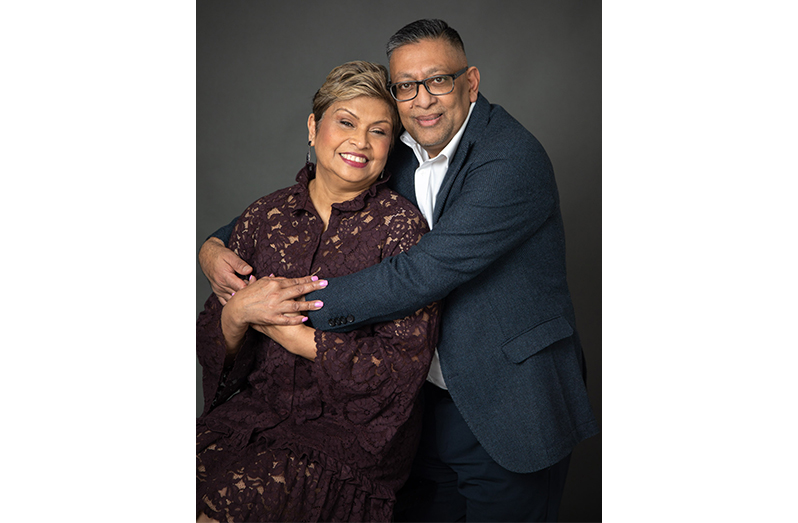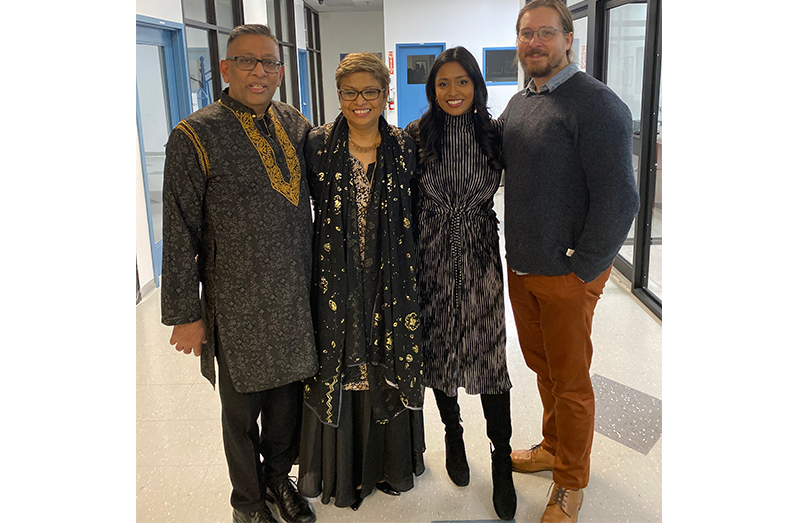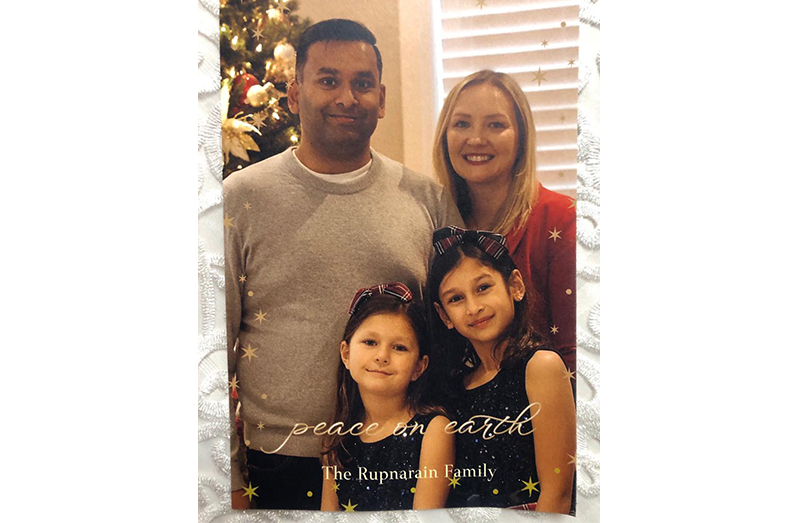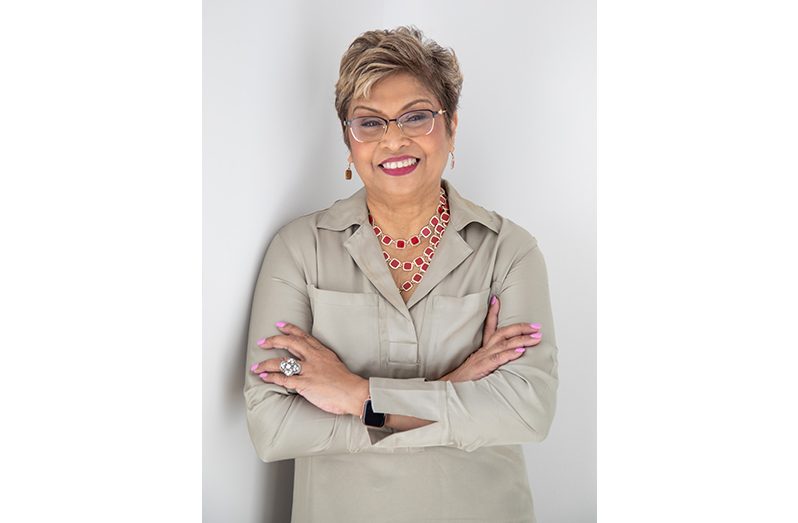–Guyanese-Canadian works with NGO to tackle human trafficking and prevention of all forms of violence
ONCE a girl is entrenched in the sex industry, getting them out can be very difficult, as certain misconceptions about the lifestyle can be attractive to many people. This is the view of the Guyana-born Executive Director of the non-governmental organisation (NGO), Family Services of Peel, in Ontario, Canada.
According to Sandra Rupnarain, who is a co-pastor with her Guyanese husband, Richard, at Calvary Worship Centre, Mississauga, “The ideas of designer clothing, expensive gifts and fast cars become enticing. And so young women fall victim to the fast pace and unpredictable trade.
“The most common approach utilised by Canadian traffickers is the illusion of love, false promises of gifts and special treatment that point to a happy future that doesn’t involve working minimum wage jobs, and that’s how they’re lured in,” she says.
Rupnarain pointed out that “survivors feel they’re often blamed and stigmatized, and seen as willing participants in selling their bodies. And so, there is ignorance around this issue.”

As the Executive Director of the NGO, she is focused on transformational leadership, living the culture, and leading by example through setting expectations and leveraging human capital.
Sandra creates a culture of learning and motivating through mentoring, a systemic approach, and evaluative measures based on actionable long-term and short-term outcomes. She is a Clinical Fellow with the American Association of Marriage & Family Therapists (AAMFT) with a private practice in Toronto, and a clinical practitioner with expertise in Narrative, Solution-Focused Behavioral Therapy, and Mental Health with a focus on Trauma and Addiction Interpersonal Violence.
She established the Peel Institute on Prevention in 2012, a Family Services of Peel research arm that bridges academia and community to develop evidence-based services on all forms of violence prevention. Her special interests are in evidence-informed practice, data-driven quality improvement, and equitable service outcomes. Sandra has presented to various audiences locally, nationally, and internationally on promising practices with a diverse and anti-oppressive lens.
Giving an overview of human trafficking, Sandra posited that it has many faces, whereby most victims are subject to sexual exploitation.

“While we, ourselves, are not experts in human trafficking, we know that through knowledge-sharing and active participation, we can create changes, and that through collaboration and perseverance, we can also become a global success story of commitment to doing the right thing,” she said. According to Sandra, her organisation’s goal is to strengthen the capacity of service providers to serve survivors of human trafficking in the Region of Peel. “We applied a theory of change that asserts that women’s rights are human rights. Our work is grounded in an equity, anti-racism and anti-oppression framework; this framework introduces the determinants of health and well-being into the strategies of prevention, services, programmes, research, and policies on human trafficking.”
Sandra posited that those at the most risk of being trafficked are those with low economic status, Indigenous populations, and people with disabilities. “We know that Indigenous women — and I don’t need to elaborate too much on that—are more likely to experience discrimination, poverty, poor living conditions, and violent crimes,” she explained. “Few researchers have examined the sex trafficking of women with disabilities. Some specific vulnerabilities include the lack of awareness of exploitation on the part of the victims, the inability of victims to self-identify the exploitation, and the relative ease with which traffickers can manipulate these girls and women.”
Sandra went on to explain, “One of the greatest challenges in the battle against human trafficking is removing the veil of silence that allows this oppressive behaviour to flourish. A lack of understanding about the scope and severity of the problem has also contributed to its dramatic rise, so there is also a need for research and data collection.” She added that, “In terms of services for men, interestingly, we have that as part of talking about the human trafficking and sexual exploitation of women. There is a lack of services for men, and this is often because of the assumption that men do not seek psychological help because of the stigma of showing emotions. This represents a large area of unmet needs because men who have been trafficked have health problems, mental health issues, and needs similar to trafficked women. As their needs are similar, there must be services available equally for them.”
According to Sandra, “If we’re able to have a long-term impact on the problem, we must use research to identify the most cost-effective ways of intervention. The Government of Canada has developed and implemented its tools for the prosecution of traffickers, thereby responding to most of the prosecution recommendations of the UN protocol in 2000. However, international data shows that legal and police prosecution has not reduced the aggregate amount of trafficking. The focus should be on prevention and support for survivors.

“The more structural elements of prevention have yet to be adequately sourced. They have not happened as of yet, including awareness-raising campaigns, education campaigns, and training. It can only be achieved through research and, again, through victims’ participation in the entire process so we are duly informed and we’re not making our decisions in ivory towers and just through research alone.
“We talk about training. Service providers need to be trained on how to work with the population. Training at all levels needs to be developed and implemented. The available training currently does not have a proper evaluation process. The training was developed with no evaluation process attached to it. There’s no reiteration of what’s working and what’s not working. There’s a great need to develop evaluations that measure impact and a need for a robust social and health care system response as well.
Sandra disclosed that of the magnitude of the problem, human trafficking is a social issue of growing concern across the globe. “As we have heard from many of our witnesses, the estimated number of individuals affected by human trafficking worldwide is 20.9 million. It is the fastest-growing area of organised crime and the third-largest income-revenue stream for systemised crime after narcotics and arms sales. The global sex trade is worth about $32 billion annually. This is because women and girls in sex trafficking earn profits for their pimps and traffickers over a great number of years.”
Sandra has been in ministry for over 40 years and has co-pastored with her husband in Guyana, New York, and Canada. Her approach to ministry includes the perspective that “change is not a bad thing” and that the bedrock of successful Christian living is intimacy with God, including “knowing yourself.” Her family includes her children Stephen, his wife Stephanie, Kimberly her dog Reggie and the two most precious people, her granddaughters -Emma Grace and Elise Ava. She loves reading, going for long walks, and nice teas.
Among her Special Awards are the Public Speaking/Scholastic Achievement Award -Toronto, Canada, Teacher’s Assistant in Counselling Programme- Tyndale College and Seminary – Toronto, Canada, Community Service Chaplaincy Course -School of Chaplaincy – Tennessee, USA, English Tutor in College – New York, USA, Deans’ List/Graduated (cum laude) New York, USA and Award of Merit – Outstanding Service as a Teacher- Guyana.
Sandra was born and raised in La Bonne Intention (LBI) on the East Coast of Demerara, Guyana, approximately eight miles from Georgetown. She attended LBI Primary School and Annadale Secondary School. She started teaching at LBI Kindergarten School (during its pilot phase in Guyana) right out of High School. She studied at City University in NY, York University, and Tyndale College and University in Canada. She migrated to New York in 1983, and to Canada from New York in 1989.



.jpg)








